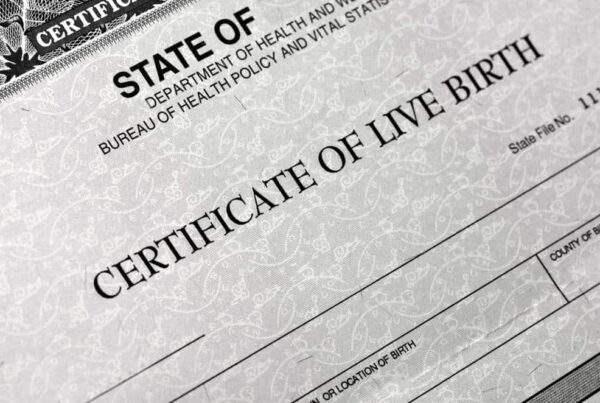
The U.S surrogacy laws that will impact your specific circumstances will depend on the state that you are in, as well as individual factors such as your marital status and sexual orientation. Some states are more favorable than others, but regardless of which state you are in, it’s crucial that you look for the best legal representation to support you throughout the entire process, whether you are an intended parent or a surrogate.
The path to surrogacy requires both parties to go through two key steps. The first is a surrogacy agreement between the surrogate mother and the intended parents. The second is a declaration of parentage which will be required in order to list the intended parents on the birth certificate.
It is highly recommended that you seek legal advice as early as possible into the process. This will allow the legal advisors a chance to get a clear handle on your specific circumstances.
[fusion_code]PHNjcmlwdCBzcmM9Ii8vbXkudmlzbWUuY28vdmlzbWUuanMiPjwvc2NyaXB0PjxkaXYgY2xhc3M9InZpc21lX2QiIGRhdGEtdXJsPSIzMWd5bTB5ZS1zdXJyb2dhY3ktbGF3LWluLXRoZS11bml0ZWQtc3RhdGVzIiBkYXRhLXc9IjgwMCIgZGF0YS1oPSIyODEwIiBkYXRhLWRvbWFpbj0ibXkiPjwvZGl2PjxwIHN0eWxlPSJ3aWR0aDogMjIwcHg7IGZvbnQtZmFtaWx5OiBBcmlhbDsgYm9yZGVyLXJhZGl1czozcHg7IHBhZGRpbmc6IDNweDsgYmFja2dyb3VuZC1jb2xvcjogcmdiYSgwLCAwLCAwLCAwLjEpOyBmb250LXNpemU6IDEwcHg7IGNvbG9yOiAjMzMzMzMzIiA+U3BlYWsgVmlzdWFsbHkuIENyZWF0ZSBhbiBpbmZvZ3JhcGhpYyB3aXRoIDxhIGhyZWY9Imh0dHBzOi8vd3d3LnZpc21lLmNvL21ha2UtaW5mb2dyYXBoaWNzP3V0bV9zb3VyY2U9Q1RBJnV0bV9tZWRpdW09RW1iZWQiIHRhcmdldD0iX2JsYW5rIiBzdHlsZT0iY29sb3I6ICMzMGEwZWEiPjxzdHJvbmc+VmlzbWU8L3N0cm9uZz48L2E+PC9wPgoK[/fusion_code]
This infographic is designed by Family Tree Surrogacy Center a surrogacy agency in San Diego, CA, USA.
US Surrogacy Laws By State
There are no federal laws regarding surrogacy in the United States. Surrogacy laws will also vary depending on which state you are in. The laws will affect both surrogate mothers and the intended parents, so it’s a good idea to understand the laws of your state before you take your next step. As with most state jurisdictions, the lenience can vary massively from state to state.
In this section, we will break down each state into one of three categories: favorable, unfavorable and somewhat favorable. The majority of states will fall into the somewhat favorable category, so in order to prevent any confusion, we will also share a few extra details about the law in each individual state.
Favorable States (Surrogacy Friendly)
Favorable states are simply states that have either been highly favorable in court cases in the past, or they have statutes that permit and recognize surrogacy. Favorable states will generally grant pre-birth orders to intended parents without prejudice against their marital status or sexual orientation.
Maine
As long as the statute requirements are met, the Parentage Act of 2016 will gladly issue a pre-birth order to intended parents in the state of Maine.
Delaware
Similar to Maine, the state law in Delaware will permit surrogacy if statute requirements are met. However, the final decree will not be issued until after the child is born.
Connecticut
There are no legal obligations against the surrogacy process in the state of Connecticut.
California
California is one of the most favorable states for surrogacy. Previous cases (Calvert V Johnson (1993) and Buzzanca v Buzzanca (1998)) have demonstrated the state’s leniency towards supporting surrogacy.
New Hampshire
The state of New Hampshire is favorable towards surrogacy as long as a few minimum standards are met by the gestational carrier. The surrogate needs to already be a mother and must be aged above 21 years. There are certain requirements that must be met, but the state is certainly favorable.
Nevada
Surrogacy is permitted in Nevada. Pre-birth order will generally be dealt with outside of the courtroom.
Oregon
Surrogacy is generally permitted by the courts in Oregon. Declarations of paternity will be issued pre-birth.
Washington
Washington state law allows surrogacy arrangements as long as there is no compensation for the action.
Rhode Island
All cases must be heard by the Chief Judge of Family Court, but there are no state laws that govern the surrogacy process. The state is generally favorable.
Unfavorable States (Non-Surrogacy Friendly)
Unfortunately, there are still several states who will not support (compensated) surrogacy. These states will generally not recognize contracts between gestational carriers and intended parents. Pre-birth orders are rare and are usually unenforceable. Surrogacy agreements that don’t abide by the state law can be subject to criminal penalties or financial repercussions.
New York
New York is definitively a non-surrogacy friendly state. Compensated agreements are forbidden and anyone who enters one can be fined up to $10,000. Lawyers and surrogacy agencies are subject to both fines and criminal penalties if they are found to be facilitating surrogacy agreements.
New Jersey
The state of New Jersey forbids compensated surrogacy. However, they are likely to favor remunerated or compassionate surrogacy. Pre-birth orders will not be issued until at least 72 hours after the birth. The surrogate mother will have to relinquish her rights to the child(ren).
Michigan
Michigan courts will not support compensated surrogacy agreements. Compassionate surrogacy is fine, however.
Somewhat Favorable States
The remaining states are what we would consider “somewhat favorable” states. Compensated surrogacy may be allowed, but the bar of requirements is usually set a lot higher. The legal process could be considerably more extensive and complex, and the courts are less consistent with their rulings than in a favorable state.
Alabama
Courts are generally favorable depending on the circumstances. Unmarried couples may struggle to get a pre-birth order.
Arkansas
Arkansas courts are generally very favorable towards surrogacy. They are especially favorable towards married couples or parents using their own eggs/sperm.
Colorado
Colorado courts are generally favorable, regardless of the type of parents that intend to take care of the child. There is no law governing the surrogacy process.
Florida
Florida courts are favorable towards both traditional and gestational surrogacy, as long as the intended parents are legally married.
Georgia
Georgia courts are generally favorable, regardless of the type of parents that intend to take care of the child. There is no law governing the surrogacy process.
Hawaii
Courts are favorable towards those who use their own egg and sperm. The final decree will be issued after the birth of the child. There will be no pre-birth orders issued.
Illinois
The statute in Illinois is highly favorable towards the entire process of surrogacy. There are certain requirements that need to be met in regard to the intended parent’s gametes.
Kansas
There are no laws governing the surrogacy process in Kansas, but pre-birth orders may be granted as long as the parents are using their own eggs and sperm.
Kentucky
There are no laws governing the surrogacy process in Kentucky. Pre-birth orders may be issued to married couples.
Massachusetts
There are no laws governing the surrogacy process in Massachusetts but the courts are sometimes favorable. Pre-birth orders are often granted.
Maryland
There are no laws governing the surrogacy process in Maryland but the courts are sometimes favorable. Pre-birth orders are often granted.
Minnesota
There are no laws governing the surrogacy process in Minnesota but the courts are sometimes favorable.
Missouri
There are no laws governing the surrogacy process in Maryland but the courts are sometimes favorable. However, courts will generally issue only post-birth declarations.
North Carolina
There are no laws governing the surrogacy process in North Carolina but the courts are usually favorable. The location of the court will determine whether a pre-birth or post-birth order will be granted.
North Dakota
Statute in North Dakota will permit gestational surrogacy. Pre-birth orders can usually be obtained without having to go to court.
New Mexico
Pre-birth orders will more than likely be granted, although the statute does not suggest whether surrogacy is prohibited or permitted.
Ohio
Past cases show that surrogacy agreements will be supported by the courts. Pre-birth orders may be granted depending on the circumstances. Court appearances may or may not be required.
Pennsylvania
There is no governing of surrogacy in the state of Pennsylvania. Results will depend on the venue, the location and the individual judge involved with your case.
South Carolina
There are no laws governing the surrogacy process in South Carolina but the courts are generally favorable. The court location will determine the likelihood of achieving pre-birth or post-birth orders.
South Dakota
There are no laws governing the surrogacy process in South Dakota but the courts are generally favorable. You should have no problem obtaining a pre-birth order.
Texas
The state of Texas will permit surrogacy agreements as long as the contracts have been approved by a judiciary in advance. The courts may only favor married couples, and the location of the court will determine whether one, or both parties, have to show up to court.
Utah
The state of Utah will permit surrogacy agreements as long as the contracts have been approved by a judiciary in advance. However, courts will only validate post-birth orders.
Vermont
There are no laws governing the surrogacy process in Vermont but the courts are generally favorable. However, the courts will only validate orders post-birth.
Wisconsin
Surrogacy is permitted and although pre-birth orders will be passed, a final order will need to be issued post-birth. Married couples are usually favored more than single parents. Court appearances may or may not be necessary depending on the court.
West Virginia
West Virginia courts are usually favorable towards married couples. They will also issue pre-birth orders if all parties have given their piece.
Alaska
The courts are generally favorable as there are no laws governing surrogacy. Surrogacy has been equated with adoption since 1989 when the Supreme Court ruled it so.
Arizona
Arizona always recognized the surrogate mother and her husband (if she had one) as the birth parents. Surrogacy was forbidden. However, in 1994 the Arizona Court of Appeals ruled that the parentage presumption was rebutted to the intended parents.
Iowa
The courts in Iowa are generally favorable although the Iowa Code exempts surrogacy from criminal provisions.
Idaho
Idaho has now law or statute prohibiting surrogacy. A non-genetic parent will have to adopt the child to be recognized as a legal parent.
Indiana
Surrogacy agreements are unenforceable. However, certain judges may grant pre-birth orders.
Louisiana
The courts are favorable towards heterosexual and married couples who use their own egg and sperm.
Mississippi
There are no laws governing surrogacy but the courts are sometimes favorable.
Montana
There are few published cases of surrogacy law in the state of Montana. There is no law governing the process.
Nebraska
Compensated surrogacy agreements will be void and unenforceable in Nebraska courts.
Oklahoma
The courts in Oklahoma are generally favorable, although there is no governing law.
Virginia
Virginia courts will support surrogacy agreements but the process can be long and complex. The easiest route is to try and amend the birth certificate post-birth.
Wyoming
There are few published cases of surrogacy agreements in the state of Wyoming. There is no law governing the process.
This information does not act as a substitute for legal advice or legal counsel. The information is provided for informational purposes only. Always consult legal advice before undertaking a surrogacy journey.


